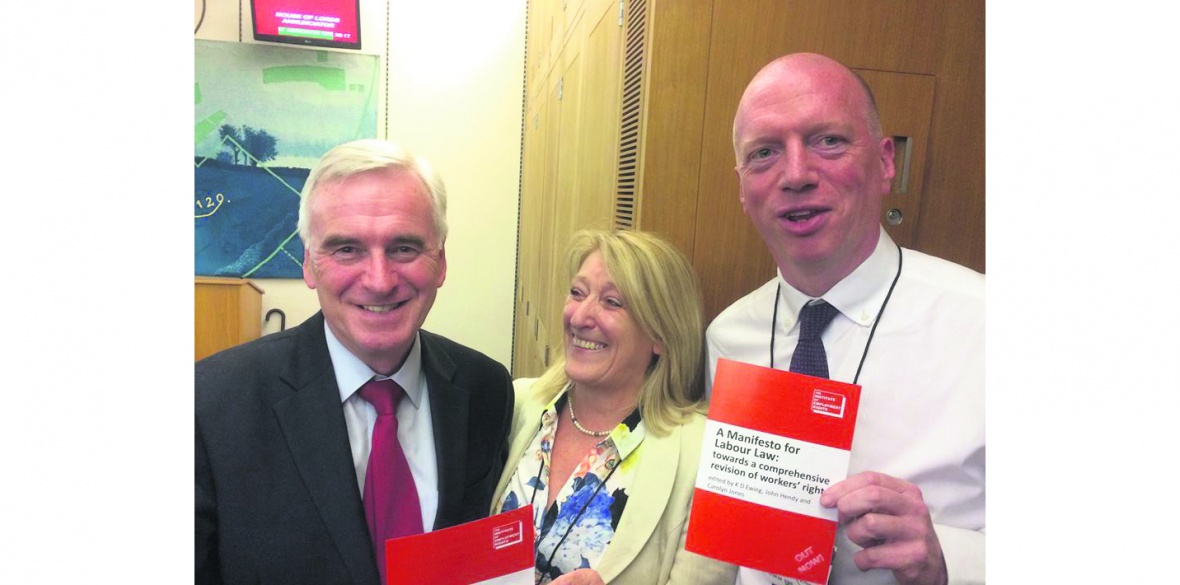This is the last article you can read this month
You can read more article this month
You can read more articles this month
Sorry your limit is up for this month
Reset on:
Please help support the Morning Star by subscribing here
AS THOUSANDS take to the streets tomorrow to again demand a fair day’s wage for a fair day’s pay, it is tempting to think what we might be doing if last year's election had gone differently.
Labour outperformed all expectations, denied the Tories a widely expected majority and came closer to government than anyone thought possible — though, as Jeremy Corbyn would tell you, not close enough.
If the campaign was just a few weeks longer, we might be marching today celebrating, rather than demanding, a new deal for workers.
At the core of Labour’s electoral success was a bold and progressive manifesto, For the Many, Not the Few, compared to the 1983 “suicide note” and dismissed as “a shambles” by the Tories when it was leaked to the Telegraph, the government has shamelessly pinched from it ever since.
Unsurprisingly, however, the Tories have done nothing for employment rights, the right to guaranteed hours, to sick and holiday pay, to a safe working environment with proper facilities.
Gig economy barons like Uber, Deliveroo, Sports Direct and Pimlico Plumbers have run amok while employment tribunals and courts remain powerless, or unwilling, to prevent genuine employees denied the benefits of employment.
The Institute of Employment Rights (IER) “has been working with the trade union movement for 30 years” since it was founded in 1989 during “the dark days of Thatcherism,” director Carolyn Jones tells the Star.
In the late ’80s “unions were being hit by wave after wave of anti-union laws and a new narrative was needed to turn back the neoliberal tide and highlight the progressive case for trade unions,” Jones says.
Since then, “it’s been a hard slog. Sometimes it felt like those in our own boat were rowing against us.
“But things change and IER ideas and policy proposals are now winning support not just from trade unions but within the Labour Party.”
Support from the Labour leadership may finally see proper legal protections enacted in law to prevent employers, such as Pimlico Plumbers, using loopholes to avoid paying a fair wage.
Pimlico Plumbers founder and Tory donor Charlie Mullins dragged Gary Smith to the Supreme Court earlier this year to try to maintain the gig economy. Smith had been sacked, having asked to work part-time after a heart attack, and was found to be an employee by the High Court and Court of Appeal.
Jones says many of Labour’s manifesto proposals came straight from the IER Manifesto for Labour Law, which calls for “a comprehensive revision of workers’ rights.”
“From a Ministry of Labour at the heart of government to a new system of labour courts and labour inspectors charged with stamping out bad-employer practices.
“Our ideas put trade unions at the heart of industrial and economic planning and give them a seat at the national negotiating table. It makes economic, industrial and legal sense.
“Workers need a voice in how things are done and a bigger slice of the cake they produce.
“The tide is turning. It’s time for a new deal for working people.”
IER chairman John Hendy QC says a Labour government is “essential” to ending precarious “Victorian” working practices returning under successive Tory governments.
“The recent publicity surrounding the gig economy, Uber, Deliveroo and other cases, and the Taylor Review, highlight the hideous complexity of labour law in the UK generally and in particular the different forms of engagement employers use,” Hendy tells the Morning Star.
He adds that many of the new types of employment models devised by employers are little more than “reversions to Victorian casualisation models.”
The “underlying problem,” Mr Hendy says, is that “labour law is founded on the notion that every worker enters a contract with their employer and the terms of this contract regulate the relationship, like a commercial contract between two multinationals.
“This formula ignores the reality that the terms of workers’ contracts are written by one party exclusively, the employer, and the employer’s (standard) terms are offered on a take-it-or-remain-unemployed basis.”
The solution, he says, is obvious — “a new simple, single status for all employment relationships in which the worker enjoys all employment rights from day one.
“The only exception to this would be the worker who is genuinely in business on her own account, such as the jobbing plumber or window cleaner or barrister.
“This will require new legislation for which the return of a Labour government under Corbyn is essential.”
Jones agrees, saying Labour’s sectoral collective bargaining proposal is “another crucial measure” in securing a new deal for workers.
Its introduction would mean “the unions and employers in each industry will agree and set the terms and conditions for all workers in that industry,” she says.
“One of the many beneficial effects of this will be that there will be less incentive for employers to use shady forms of engagement since all the workers in the industry, whatever the legal form of their engagement, will enjoy the same minimum terms and conditions.”
The Institute of Employment Rights has taken the theme Preparing for Power over the last year, as it marshals the expertise of the labour movement to feed into practical policy for the next Labour government.
Now we need to win that government and see this programme implemented.








